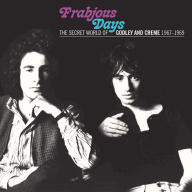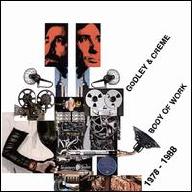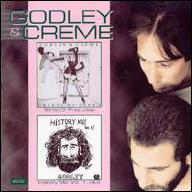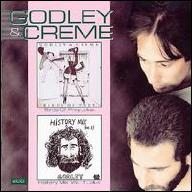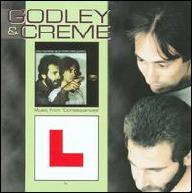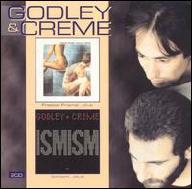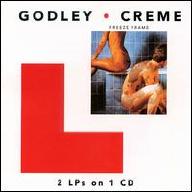Kevin Godley was born in Prestwich, Lancanshire, England on October 7, 1945, and Laurence Neil Creme, nicknamed Lol, was born in the same city roughly two years later, on September 19, 1947. The two grew up on the same street and became close friends; their first creative collaboration came when the boys attempted to make a vampire film with a borrowed 8mm camera. Godley Creme both developed a taste for music, and by 1963, Creme had developed enough skill as a guitarist to join a local beat group called the Sabres. When the combo went through a personnel shake-up, Godley signed on as the Sabres' drummer, and they played occasionally through the north of England. They practiced at a rehearsal studio popular with local acts, including the Whirlwinds, featuring guitarist Graham Gouldman, who would later join Godley Creme in 10cc; the high point of the Whirlwinds' career was cutting a single for EMI's HMV label, with Creme penning the B-side, "Baby Not Like You." Like an impressive number of British rock musicians of the era, Godley Creme both enrolled in art school, and though they were on different campuses, they continued to work on music together. They stayed in touch with Gouldman, and when they were making a student film, he helped them with a song they were writing for the soundtrack. Gouldman would give the tune some extra polish, and it became "Pamela, Pamela," which was a hit for Wayne Fontana in 1967.
Godley Creme were emboldened by the success of "Pamela, Pamela," and in 1967, they acquired a manager and cut a single that would go unreleased. Their next effort would fare better; as the Yellow Bellow Room Boys, they'd issue a single on CBS, "Seeing Things Green" b/w "Easy Life," though they were unable to tour in support, and CBS responded by hiring a band to impersonate them for promotional efforts, though they never played live. The single didn't move many copies, but it made enough noise that they were signed to a publishing contract, and Graham Gouldman and Harvey Lisberg agreed to manage the duo, paying them a princely five pounds a week. (They supplemented their salary doing design work on the side.) Gouldman had been working with Marmalade Records, a label founded by Giorgio Gomelsky (who had previously managed and produced the Yardbirds), and he brought Godley along to sing on a session he was producing. Gomelsky was immediately impressed with Godley's singing, and when he learned the singer was working as a duo with Creme, he made them an offer to join his label. Godley Creme cut a pair of songs that would appear on a Marmalade sampler, and Gomelsky, happy with the results, decided they should cut an album. He also came up with a new name for the duo, Frabjoy and Runcible Spoon, taken from the nonsense verse of Lewis Carroll and Edward Lear. A single from the group, "I'm Beside Myself" b/w "Animal Song," came out in September 1969 and was psychedelic pop informed by American folk rock, in particular Simon Garfunkel. Work began on a Frabjoy and Runcible Spoon album, with Godley Creme joined in the studio by Gouldman and guitarist Eric Stewart, who owned Strawberry Studio, where the sessions took place. Unfortunately, while the majority of the album was completed, Gomelsky's finances bottomed out, and Marmalade Records was out of business two months after Frabjoy and Runcible Spoon's debut single was issued. (The surviving material for the album finally saw release in 2022 on the collection Frabjous Days – The Secret World Of Godley Creme 1967-1969.)
Left high and dry by Gomelsky, Godley Creme were looking for opportunities and found one when Gouldman was contracted by Jerry Kasenetz and Jeffrey Katz to write and record material for their lucrative bubblegum pop empire, founded on hits by the likes of the Ohio Express and the 1910 Fruitgum Company. Gouldman had partnered with Stewart at Strawberry Studio, and Godley Creme were invited to help with the project. The collaboration went well, and they continued to write and record material after the Kasenetz-Katz contract was fulfilled. While Gouldman was in America for a few months, Godley, Creme, and Stewart came up with a minimal but catchy tune called "Neanderthal Man," and released under the name Hotlegs, it became an international hit in 1970. When a follow-up single failed to make an impression, the group evolved into 10cc, with Gouldman returning to the lineup. They recorded a witty '50s pop pastiche called "Donna," which landed them a deal with Jonathan King's U.K. label, and the tune rose to number two on the British singles charts. It was the first salvo in an impressive run for 10cc, who would mature into one of the most successful British acts of the 1970s, scoring five Top Ten albums in the decade and breaking in the United States with 1975's The Original Soundtrack and its single "I'm Not in Love." However, Godley Creme's partnership with Gouldman and Stewart began to fray as they experienced increasingly strong creative differences, and not long after the release of 1976's How Dare You!, they left the group to strike out on their own. Gouldman and Stewart would continue on, using the 10cc name.
Godley Creme came up with an idea for a guitar effects device that would allow players to simulate the sound of a violin and sustain notes as long as they wished, calling their gadget the Gizmo, or Gizmotron. The pair wanted to record an EP to show off their new invention, and in time, the project expanded into an elaborate three-LP concept album called Consequences, which included vocals from Sarah Vaughan and narration from comedian and actor Peter Cook. The album received poor reviews and sales were disappointing, and the duo's next release, 1978's L, was a considerably more compact effort, whose songs and style more closely reflected their work with 10cc. 1979's Freeze Frame included guest appearances from Paul McCartney and Roxy Music guitarist Phil Manzanera and found them once again exploring the possibilities of the studio, especially with their use of electronics on "I Envy Inanimate Objects." 1981's Ismism saw Godley Creme handling all the instrumental work themselves (except for Bimbo Acock's saxophone), and was released in the United States with a dramatically different cover under the title Snack Attack. While Ismism was a commercial success in the United Kingdom, peaking at number 29 on the album chart, 1983's Birds of Prey was poorly received by both critics and fans and failed to chart at all. They took a bold approach for the 1985 album The History Mix, Vol. 1; for most of the tracks, they created remixes that combined sonic elements from a number of different songs from their back catalog, using the Fairlight CMI synthesizer and sampler to cut and paste the material into new forms, while J.J. Jeczalik and Trevor Horn of the Art of Noise matched the tracks to dance beats. 1988's Goodbye Blue Sky found Godley Creme dealing with environmental themes as well as using the harmonica duo of Mark Feltham and Mitt Gamon on several tracks, with members of Londonbeat adding backing vocals.
By this time, making music had become a sideline for the pair, as they were enjoying great success directing music videos for other artists. They had directed clips for their songs "An Englishman in New York" (1979) and "Wide Boy" (1980), and their grasp of the medium led to them directing promos for Duran Duran ("Girls on Film"), Herbie Hancock ("Rockit"), the Police ("Every Breath You Take"), Huey Lewis the News ("Hip to Be Square"), and Peter Gabriel ("Biko"), among many others. Kevin Godley and Lol Creme dissolved their creative partnership in 1989, with the former continuing to direct music videos and television commercials, while Creme worked with the Art of Noise. In 1992, 10cc released their album … Meanwhile, which had been promoted as a reunion of the band's original lineup. However, while Godley sang lead on "The Stars Didn't Show," and he and Creme contributed backing vocals on several tracks, they were not invited to participate in the writing or production of the music, and it marked the last time they worked together. ~ Mark Deming, Rovi


